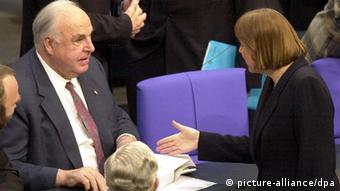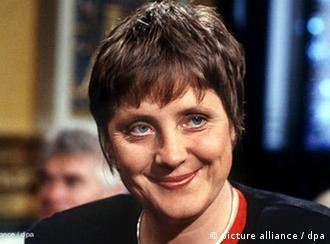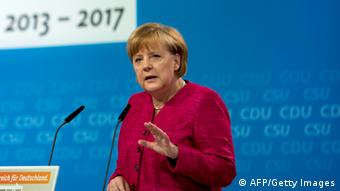POLITICS
The past that shaped Angela Merkel
Few would have predicted a political future for Angela Merkel who, many think, has little charisma and few skills to make it in the media age. ....
Data, facts and figures
It's important to know where Angela Merkel comes from to understand how she became who she is. Rarely in Germany's recent history has a politician been as underestimated as Merkel. In her TV first appearances, the daughter of a priest from the East German countryside had no concept of how to act in front of a camera. There was no missionary zeal, rather, she was a very pragmatic person.
"Merkel is not driven by ideology," says journalist Jacqueline Boysen who wrote a biography on her before she became chancellor. "She is able to take decisions based on data, statistics and facts." If reason and argument suggest a certain decision, Merkel can ignore ideology or limiting party programs, Boysen explains.
Pragmatism is what counts, and so, Merkel can also review and change her own positions. After the Fukushima nuclear accident in Japan, she made an about-face on her former pro-nuclear stance and began to promote the phase-out of atomic energy. Changing her position didn't lead to any political damage; quite the contrary: she has changed from being perceived as "Helmut Kohl's little girl" to becoming simply "Mom." In short: she's got a tight grip on her party and the government. And there are good reasons for that.
Lessons learnt in East Germany
For instance, there is her happy childhood and the teenage years in the former communist East Germany. Angela Merkel was no dissident, no opposition activist. She did experience the usual limitations of the socialist dictatorship but it didn't affect her. "There was no dark shadow over my childhood," Merkel once described her past. But what she probably did learn from those years was to be careful in how to deal with others. Living in the GDR taught her to be neither too opportunistic nor to dogged.
Angela Merkel is a good listener. Others describe her as someone with good communication skills. She's got the reputation of grasping a problem quickly but taking her time to make a decision on it. "I certainly don't decide things ad-hoc," the chancellor says about herself. "I look at a process in its entirety and also look ahead where a possible decision would take me." It's the scientist in her.
No traditional political career
Merkel came to politics late. And rather by accident. She was press spokeswoman of the last GDR prime minister, Lothar de Maiziere, and it became her chance to realize her talents at organizing and communicating. She'd only joined the Christian Democrats shortly before that, but hard work and ambition got her very far, very quickly.
In Kohl's cabinet she became minister for environment and nuclear safety in 1994. It was an important political post and a fitting ministry for her as she holds a PhD in physics. Regarding the controversial issue of what to do with radioactive waste, she was certain that the risks are controllable and that there was no alternative to nuclear energy. It was only after the Fukushima accident that she changed that position.
When Helmut Kohl lost the 1998 election, the party was in shock. But not Merkel: She realized it was her chance to find a place for herself in the post-Kohl era. The new head of the Christian Democrats, Wolfgang Schäuble, made her Secretary General and when Kohl got entangled in a party donations scandal, it was Merkel who took him off his high moral pedestal.
Which direction?
In April 2000, Merkel became head of the Christian Democrat Party (CDU) and in 2005 she made it into the chancellery - albeit as head of a grand coalition with her party's main opponents, the Social Democrats. Nonetheless - Merkel was chancellor.
Today, she's been at the helm of the party for 13 years and chancellor for the last eight. Her rivals from within the Christian Democrats have all fallen one by one over those years. There's no question Merkel can lead - but the question is where exactly the party is headed under her leadership?
It's a question that many in the CDU are asking, concerned that the party is losing its edge and character; there are many who do not see Merkel as embodying the essence of the party she's heading.



Bin ich das nur eine wer Politik kümmeren?
ReplyDelete